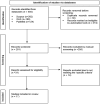The role of illness perception in the physical activity domain of health-promoting lifestyle among patients with non-communicable diseases: A systematic review
- PMID: 39514466
- PMCID: PMC11548775
- DOI: 10.1371/journal.pone.0311427
The role of illness perception in the physical activity domain of health-promoting lifestyle among patients with non-communicable diseases: A systematic review
Abstract
Background: The global mortality caused by non-communicable diseases is on the rise. Health-promoting lifestyles are among the most effective approaches, yet the physical activity domain consistently scores the lowest. Physical activity is linked to individual behaviour and influenced by numerous factors. Illness has been identified as a key factor in behavioural change. Therefore, the primary purpose of this review was to investigate the role of illness perception in the physical activity domain among patients with non-communicable disease.
Method: This systematic review follows the Preferred Reporting Items for Systematic Reviews and Meta-Analyses 2020 guidelines. A literature search was conducted across three scientific databases (Scopus, PubMed, and Web of Science), targeting original articles published in English between 2014 and 2024. The quality of the eligible articles was assessed using the Joanna Briggs Institute Critical Appraisal tools. The findings were synthesised through content analysis.
Results: A total of 17 studies were included, identifying both the direct and indirect effects of illness perception variables as a whole or in their respective dimensions. The illness perception variable has demonstrated a significant positive and negative relationships with the physical activity domain.
Limitation: The majority of the included studies had a cross-sectional design. Therefore, the evidence quality was relatively low and exhibited a high risk of bias. Furthermore, there was language bias as only English-language publications were selected.
Conclusion: The findings of this review will serve as a guide for healthcare providers in enhancing physical activity adherence among patients with non-communicable diseases through an illness perception approach. This approach can be integrated into clinic consultations and intervention programmes. Future studies are warranted to evaluate the effectiveness of the illness perception approach in promoting physical activity adherence.
Copyright: © 2024 Syed Shamsuddin et al. This is an open access article distributed under the terms of the Creative Commons Attribution License, which permits unrestricted use, distribution, and reproduction in any medium, provided the original author and source are credited.
Conflict of interest statement
The authors have declared that no competing interests.
Figures
Similar articles
-
Promoting and supporting self-management for adults living in the community with physical chronic illness: A systematic review of the effectiveness and meaningfulness of the patient-practitioner encounter.JBI Libr Syst Rev. 2009;7(13):492-582. doi: 10.11124/01938924-200907130-00001. JBI Libr Syst Rev. 2009. PMID: 27819974
-
Risk perception of non-communicable diseases: A systematic review on its assessment and associated factors.PLoS One. 2023 Jun 1;18(6):e0286518. doi: 10.1371/journal.pone.0286518. eCollection 2023. PLoS One. 2023. PMID: 37262079 Free PMC article.
-
The effectiveness of web-based programs on the reduction of childhood obesity in school-aged children: A systematic review.JBI Libr Syst Rev. 2012;10(42 Suppl):1-14. doi: 10.11124/jbisrir-2012-248. JBI Libr Syst Rev. 2012. PMID: 27820152
-
Beyond the black stump: rapid reviews of health research issues affecting regional, rural and remote Australia.Med J Aust. 2020 Dec;213 Suppl 11:S3-S32.e1. doi: 10.5694/mja2.50881. Med J Aust. 2020. PMID: 33314144
-
The impact of COVID-19 on non-communicable disease patients in sub-Saharan African countries: A systematic review.PLoS One. 2024 Jun 21;19(6):e0293376. doi: 10.1371/journal.pone.0293376. eCollection 2024. PLoS One. 2024. PMID: 38905254 Free PMC article.
Cited by
-
Association Between Physical Activity and Suicidal Ideation: The Moderating Effect of Self-Rated Health Status.Healthcare (Basel). 2025 Jun 24;13(13):1506. doi: 10.3390/healthcare13131506. Healthcare (Basel). 2025. PMID: 40648531 Free PMC article.
References
-
- Countdown NCD 2030: worldwide trends in non-communicable disease mortality and progress towards Sustainable Development Goal target 3.4. Lancet. 2018;392(10152):1072–88. - PubMed
-
- WHO. Non-communicable Disease 2023 [Available from: https://www.who.int/data/gho/data/themes/topics/topic-details/GHO/ncd-mo....
-
- WHO. Noncommunicable Diseases Progress Monitor 2022 2022 [Available from: https://www.who.int/publications/i/item/9789240047761.
-
- Abdullah Z, Komariah A, V. Sirotkina N, Kurniady AD, Sunaengsih C, Panova EP. Studying the Islamic lifestyle and academic success of Russian Muslim students. HTS Teologiese Studies/Theological Studies. 2022;78(4):7568.
-
- Arena R, Guazzi M, Lianov L, Whitsel L, Berra K, Lavie CJ, et al.. Healthy Lifestyle Interventions to Combat Noncommunicable Disease-A Novel Nonhierarchical Connectivity Model for Key Stakeholders: A Policy Statement From the American Heart Association, European Society of Cardiology, European Association for Cardiovascular Prevention and Rehabilitation, and American College of Preventive Medicine. Mayo Clin Proc. 2015;90(8):1082–103. - PubMed
Publication types
MeSH terms
LinkOut - more resources
Full Text Sources
Medical


